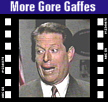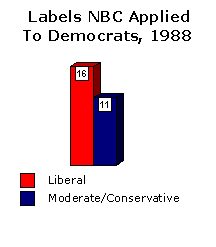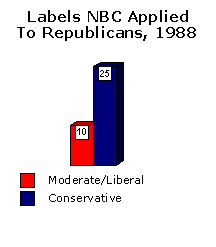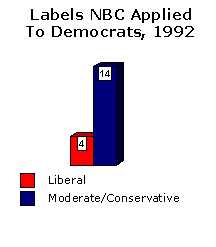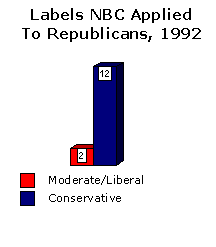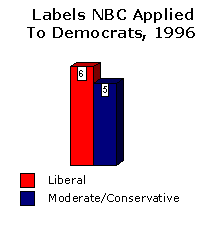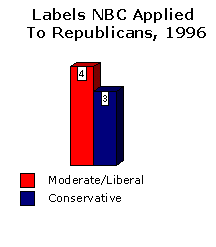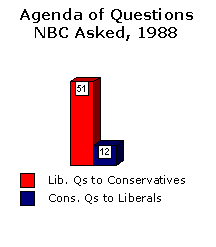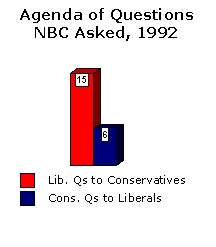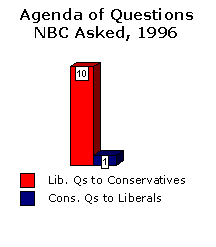|
|||||||||||||||||||||||||||||||||
|
|
|||||||
 |
||||||||||||||||||||||||
|
||||||||||||||||||||||||
 |
||||||
|
||||||
 |
||||||||||||||||||
|
||||||||||||||||||
 |
||||||||||||
|
 |
||||||||||||||||||||||||
|
||||||||||||||||||||||||
 |
|||||||||||||||
|
|||||||||||||||
|
NBC News Labeling and Questions At Republican and Democratic National Conventions, 1988-1996 Use of Labeling George Washington University Professor William C. Adams conducted the first exhaustive examination of the networks’ prime time convention coverage in 1984. The findings? Unequal treatment of the Democratic and Republican National Conventions by network anchors and correspondents. In his landmark study, Prof. Adams found that correspondents cast Republicans as ideologues by frequently labeling them "conservative" or "right-wing" while almost never labeling Democrats as "liberal" or "left-wing." Since 1988, analysts at the Media Research Center have applied Prof. Adams’s methodology to broadcast and cable convention coverage, including NBC News coverage. The numbers below demonstrate that in convention coverage, since 1988 NBC News has failed to apply ideological labels in a fair and balanced manner. Overall (1988-1996), NBC News was one and one-half times as likely to apply ideological labels to conservatives as liberals, with the total being NBC's use of forty "conservative" labels compared to twenty-six "liberal" labels. (Read the quotes.)
Agenda of Questions Balanced reporting requires that correspondents periodically don Devil’s advocate hats. One of the most efficient ways of doing this is to pose challenging questions to interviewees — conservative/Republican-agenda questions to Democrats, and liberal/Democratic-agenda questions to Republicans. The numbers below show that NBC News’s performance in this area is shockingly poor. In fact, over the past three conventions, combined data show NBC News anchors and correspondents posed more than three times as many of these challenging questions to Republicans as they did to Democrats. The totals: NBC News asked seventy-six liberal/Democratic-agenda questions of Republicans, compared to only nineteen conservative/Republican-agenda questions of Democrats. (Read the quotes.)
NBC's Use of Labels: The Numbers
NBC's Use of Labels: The Quotes Labeling Delegates Tom Brokaw compliments Democratic delegates as "well-dressed, moderate." (Broadcasting from Democratic National Convention, 7/13/92) Tim Russert casts the Republican delegation as a tough crowd: "These are difficult speeches to give as you know, Tom. He's [Dole] appealing to a very conservative audience in the hall here, but he's trying to reach independent voters out in the country." (Broadcasting from Republican National Convention, 8/15/96) Labeling Platforms Tom Brokaw passes judgement on the Democratic platform, declaring "[t]his is a centrist platform." (Broadcasting from Democratic National Convention, 7/14/92) The next month, Brokaw intones that the Republican platform is "very conservative." (Broadcasting from Republican National Convention, 8/17/92) Lisa Meyers warns that the Republican platform committee contains members of the "religious right." (Broadcasting from Republican National Convention, 8/17/92) Labeling Parties Tom Brokaw describes the Democratic party as "unified, centrist." (Broadcasting from Democratic National Convention, 7/16/92) Tim Russert confirms the supposed impression of Republicans as "mean-spirited and extremist" in this inside-baseball commentary: "Key word: mean-spirited and extremist. They want to avoid those labels. They have thus far after two days and that’s why you’re not going to see Newt Gingrich in prime time tonight. I think the speech by Senator Hutchison of Texas is dangerous, Tom, because she uses words that could be interpreted by some people as mean." (Broadcasting from Republican National Convention, 8/13/96) Lisa Myers promotes the notion of Republicans as intolerant in this question to Republican Senator Olympia Snowe: "There are those who talk about their party believing in tolerance and diversity, yet that in the reality the policies just don't reflect that. What's your quick response?" (Broadcasting from Republican National Convention, 8/13/96) Tom Brokaw asserts Republicans are indifferent to rape in this question posed to convention speaker, rape victim and victim’s rights advocate Jan Licence: "Do you think — this is a party that is dominated by men and this convention is dominated by men as well, and I don't mean that in a pejorative sense. I mean, it's just an objective reality here. Do you think before tonight they thought very much about what happens in America with rape, which is a terrible epidemic that we're suffering in this country?" (Broadcasting from Republican National Convention, 8/13/96) Labeling Candidates Andrea Mitchell classifies the Democratic Clinton-Gore ticket as "going to the center." (Broadcasting from Democratic National Convention, 7/13/92) Andrea Mitchell classifies the Republican candidates as "very conservative." (Broadcasting from Republican National Convention, 8/17/92)
Liberal/Democratic-Agenda Questions to Republicans Maria Shriver demands a delegate explain why women should remain in the Republican party: "Many moderate Republican women are actually considering voting for the Democratic ticket because they look at this platform, they look at this party, and they don’t see anything they can embrace. Why should you tell them to stay?" (8/13/96) Tom Brokaw assumes the Democrat’s economic model is correct in this question to Virginia Governor George Allen: "Governor, are you not at all concerned about what happens to the federal deficit, which is a major, major concern for most of the delegates at this convention based on the polling we’ve done, if Bob Dole is able to put into effect his fifteen percent tax cut?" (8/13/96) Liberal/Democratic-Agenda Questions to Democrats, Too Tom Brokaw works the Democratic-party-preferred explanation of Richards’s electoral loss into this question, posed to former Texas Governor Ann Richards: "You paid the price to some degree. You lost the governorship of Texas because this country still is a little bit schizoid, isn’t it, about the role of women in American politics?" (8/27/96) Tom Brokaw wonders whether the Clinton-Gore ticket might not be liberal enough in this question to then-Governor Ann Richards: "Do the poor and the inner cities get left out with this ticket?" (7/13/92) Maria Shriver furthers the liberal line that President Reagan was indifferent to AIDS in this tautological query of AIDS activist and convention speaker, Elizabeth Glaser: "You place responsibility for the death of your daughter squarely at the feet of the Reagan Administration. Do you feel they are responsible for that?" (7/14/92) John Chancellor presents his opinion of the role of "family values" in governing as absolute fact in this comment to Tom Brokaw: "The Republicans had been giving the Democrats fits about family values, even though family values have very little to do with governing. Still, that strategy has been successful." (7/14/92) Maria Shriver worries whether Republicans hurt the First Lady’s feelings in this sympathetic softball to convention speaker, Hillary Clinton: "You talked a lot tonight about It Takes a Village, your book. And as you well know, that was a lightning rod for criticism at the Republican convention. Kay Bailey Hutchison took off on it, Bob Dole took off on it. How did that affect you when you heard about that?" (8/27/96)
Convention Coverage (by Network): Back to Campaign 2000 Home Page
Home | News Division
| Bozell Columns | CyberAlerts |
||||||||||



